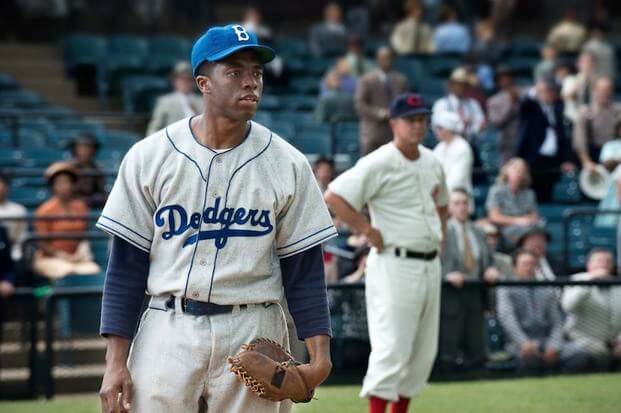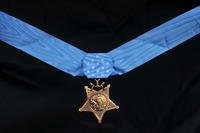Army 2nd Lt. Jack Roosevelt Robinson never saw combat in World War II, except in his lonely battle for civil rights in the military when he stood against segregation and was court-martialed for refusing to go to the back of the bus.
At the White House on Tuesday, First Lady Michelle Obama noted that Jackie Robinson “bravely served in our armed forces,” overcoming the bogus charges in the racially motivated court-martial, before becoming a legend as the first African-American to cross the white chalk lines of Major League baseball in 1947.
Mrs. Obama was presiding in the State Dining Room at a reception for the cast and crew of the new movie “42,” the number Robinson wore for the Brooklyn Dodgers.
She also brought in students to view the movie made with the advice and support of the Defense Department for a workshop on Robinson’s legacy and to hear from Rachel Robinson, Jackie’s 90-year-old widow.
Robinson, who was born in 1919 in Cairo, Ga., and became a star running back at UCLA, was drafted into the Army from Los Angeles in April 1942.
He was serving as a corporal at Fort Riley, Kan., when he and several other black troops met with the visiting Pvt. Joe Louis, the heavyweight champion. They mentioned the lack of black officers to Louis, who mentioned it later in Washington to Truman Gibson, an African-American civilian aide to Secretary of War Henry Stimson.
Robinson was allowed to earn a commission and was serving as a lieutenant at Camp Hood (now Fort Hood), Texas, with the all-black 761st Tank Battalion (The Black Panthers).
Robinson had already riled superior officers with his complaints about limited access to the post exchange for black soldiers when on July 6, 1944, he refused to move to the back of the on-post bus on order of the white driver.
In the ensuing furor over the incident, Robinson was charged with insubordination and disrespect to superior officers called to the scene, according to National Archives records and an account of Robinson’s time in the military by John Vernon, an Archives historian.
Robinson wrote to Truman Gibson before he faced a general court-martial.
"I don't want any unfavorable publicity for myself or the Army but I believe in fair play," Robinson wrote. At trial, Robinson was acquitted of all charges by a panel of nine white officers.
Robinson was already on limited-duty status because of old football injuries. He asked to be allowed to leave the military and the Army concurred, issuing him an honorable discharge
At the White House, Mrs. Obama said the lives of Jackie and Rachel Robinson were an inspiration to the first family in the examples they set by their determination.
“Now, the president and I, we watched this movie over the weekend,” Mrs. Obama said. “And I can say with all sincerity that it was truly powerful for us. I don’t know about you, but we walked away from that just visibly, physically moved by the experience of the movie, of the story.”
When asked how her husband persevered, Mrs. Robinson said “he was a tough person,” and then quickly amended her words. “Well, he was a strong person. I like that better than tough.”
Jack, as she called him, never wavered in his belief “that he could do what he had an opportunity to do,” Mrs. Robinson said. “His beliefs were his beliefs and he would fight for them."
The Defense Department personnel who helped in production of the movie by Legendary Pictures Inc., which will be released by Warner Bros. on April 12, said their work was a privilege.
“This re-introduced me to one of my idols,” said Vicente Ogilvie, deputy director for Entertainment Media at the Pentagon. “This was, of course, something we wanted to provide assistance to.”
Army Lt. Col. Steve Cole, who helped with the movie from the Army’s office in Los Angeles, said “42” made him come to grips with the era when the military was segregated.
“That’s not who we are in the Army today,” Cole said. “We kind of owed it to the memory of Jackie Robinson to support the film. You really get a sense of the measure of the man, just what a really exceptional person he was” from “42,” Cole said.
After seeing the performances of Chadwick Boseman as Robinson, and Harrison Ford as Brooklyn’s general manager Branch Rickey, Cole said he could better understand why baseball retired the number “42” and why every year on April 15 all ballplayers for one day wear “42.”
“You see the Jackie Robinson movie and you say ‘OK, that’s why. Now I get it,” Cole said.
Several scenes in the movie were shot at Fort McPherson, Ga., but Ogilvie and Cole said scenes dealing with the court-martial and acquittal of Robinson were cut from the film that runs more than two hours. The court-martial and its impact on Robinson are still dealt with in the movie’s script.
Jason Clark, the executive producer of “42,” echoed Mrs. Obama’s sentiments on the life of Jackie Robinson.
“He [Robinson] really is the father of the great movement for equality in America.”
Mrs. Obama said she was stunned by the strength and resilience of the Robinsons after watching the film biography.
“It would have been easy for them to get mad, because I know I was mad just watching the movie. It would have been easy for them to get mad or to give up. But instead, they met hatred with decency,” Mrs. Obama said.
“And you’re left just asking yourselves, how on Earth did they live through that? How did they do it? How did they endure the taunts and the bigotry for all of that time?”
Mrs. Obama later answered her own questions. “There is no magic,” she said. “All of this is about hard work, and you have to be willing to face any obstacle you might encounter along the way. That's what Jackie and Rachel Robinson did.


















